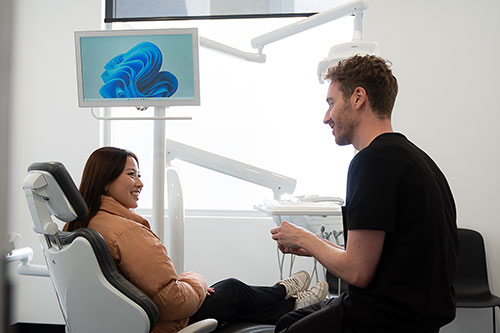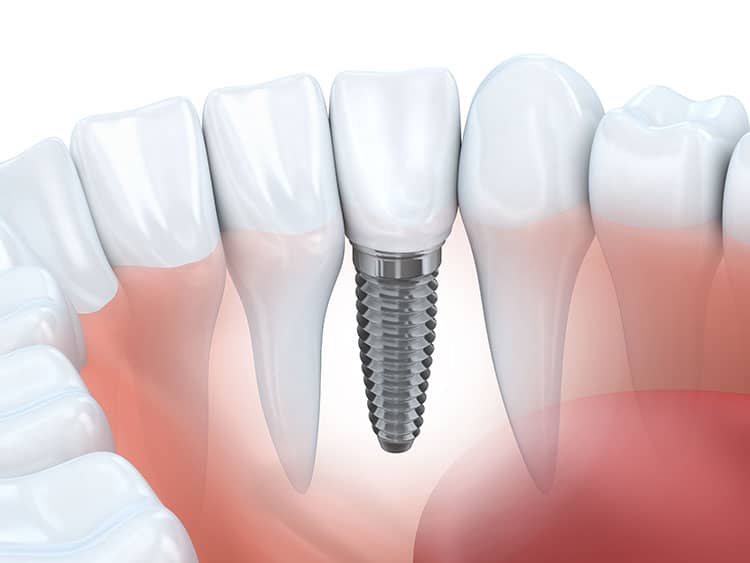What are
Dental Implants?
Dental implants are tiny posts or screws made of titanium that are surgically inserted into the jawbone. When integrated, they serve as artificial tooth roots and anchor the replacement teeth to create the look, feel, and function of your natural teeth.
Unlike natural teeth, however, it’s impossible for dental implants to decay. Since the posts are made of titanium, with regular home care and professional cleaning dental implants can last a lifetime.
How Does the
Implant Procedure Work?
The length of the treatment process and the number of appointments needed varies from patient to patient. Prior to treatment, any oral health issues, such as bone loss and periodontitis, must first be addressed before considering the implantation process. Once your dental professional decides your oral health is up to par for the implant procedure, your tailored treatment plan can begin.
During the first procedure, the titanium implant or implants will be placed. To do so, pilot holes are first skillfully drilled into the jawbone. Then the holes are slowly widened to provide enough space for the insertion of the implant screw. Then, the gum tissue surrounding the implant is secured overtop of it and a cover screw is placed over the gum to begin the healing and osseointegration process.
While this procedure typically takes place in a single sitting, the anchoring of the implant into the bone, referred to as osseointegration, can take 3-6 months. After the implants have anchored and healed, your dentist will attach an abutment to hold the replacement tooth or crown. In some instances, the abutment can be attached during the first procedure.
When the abutment is attached, a temporary crown will be created to allow the gum to grow and shape itself around. The implant process then ends with the insertion of a permanent crown.

Recovery and Aftercare
The recovery time and process varies from one procedure to the next, but in all cases, diligent oral hygiene is a must in order to prevent infection and ensure the proper fusing of the implant to the jaw bone.
Healing from the surgical implant procedure can take up to six months, while it can take an additional two months for the fitting and placement of the final crown. However, once again, the treatment, healing, and fitting timeframes vary from case to case. Fortunately, when properly cared for, dental implants can remain in place for decades of worry-free use.
Are You a
Dental Implant Candidate?
The only way to determine if implants are right for you is to have a consultation with one of our dentists. During the consult, we’ll thoroughly examine bone density as well as your teeth and gums. This may involve the use of X-rays and CT scans to evaluate the bone structure and determine where the implants should be placed.
Based on your oral health, hygiene, habits, and commitment to strictly following the aftercare instructions, you’ll be advised of the most appropriate course of action. Although the ideal candidate is one with good oral health, healthy gums, and adequate jaw bone structure, there are additional treatment options, such as soft tissue grafts and mini implants, available as well. This makes dental implants a viable option for most patients suffering from tooth loss and decay.
We create beautiful smiles with our experienced dental team!
Call us or book your appointment today.
FAQ’s
What are dental implants?
Dental implants involve a procedure to replace missing teeth. The implants are made of titanium and serve as a substitute for the missing teeth’s root structure. They stabilise replacement teeth. Once the titanium fixture is inserted into the jawbone, the dentist can attach a cap or crown (which is not the same as veneers), a fixed bridge, or a partial to a full denture.
Prior to the procedure, you will already know which attachment will be used by your dentist. Once the implant is integrated into the bone, an abutment will be placed. It is a structure that the dentist connects to your implant. The last step is when the artificial tooth or teeth are attached to the implant.
Is it safe to get dental implants?
Dental implants are not a new technology. In fact, the oral implantology that we are familiar with today has been around for more than 30 years now. It includes bone-integrated implants, which have been studied and tested for all those decades. Procedures have had great success. As long as you have the implantation procedure with professionals, such as 123 Dental, you have nothing to worry about.
Dentists are highly trained and use sophisticated devices to ensure that there are no issues with the surgery. It is why dental implants are considered one of the safest and most reliable ways to replace teeth. Not only that, but they are also the longest-lasting solution available today.
Why should I get dental implants?
Dental implants are the next best thing to natural teeth. Once they are placed, you can be confident in your smile. Here are more reasons why:
- Aside from the natural look, dental implants feel more comfortable, especially compared to dentures.
- Implants allow you to eat, smile, and talk without worries that your artificial teeth will fall out of your mouth.
- Dental implants last for a long time with proper care and maintenance.
- The success rates are high, as long as the procedure is well-planned and cared for. Technologies and techniques have significantly improved, allowing most patients to have successful implants.
Dental implants also help correct problems with the facial and bone structure. If there are no existing issues, they can help reduce bone deterioration and resorption.
Am I a good candidate for dental implants?
As with most dental procedures, you should have good oral health first. It is also a requirement to be generally healthy with the adequate jawbone to support the implant. Those with periodontal diseases and gum tissue problems may not be suitable for the procedure. Nevertheless, you will still have to talk to your dentist and be assessed to know if you can have an implant.
Most patients turn to dental implants if they have at least one tooth missing. If you do not have adequate bone in your jaw to secure the implant, you may still be able to get a dental implant with the help of a bone graft.
Will it hurt when I get dental implants?
Getting dental implants involves a surgical process in which a titanium fixture that looks like a screw will be inserted into your jawbone. That description alone may be enough to scare you away. It’s normal to be anxious, but here’s the good news: dental implants are not only safe but almost pain-free as well.
It is normal to feel a little bit of discomfort, especially after the procedure. You will be given an anaesthetic, which will numb you out. 123 Dental is all about your safety. Our facilities are 100% clean, so there is little to no risk of infection. You will be given antibiotics and medication if you need some help with the pain.
Do I need to continue visiting my dentist after the implants are placed?
Having good oral hygiene is more important than ever now that you have dental implants. But aside from that, the implant procedure does not mean you should skip your dental appointments. Regular check-ups are a must, alongside brushing and flossing. You will also need to eat a nutritious diet to help make sure your implant lasts for a long time. Follow our tips, so you have a healthy mouth. They apply to people without implants, too.
At times, your dentist will have to clean the implant and check the health of bone tissues around. It means that X-rays and other examinations may be necessary.



